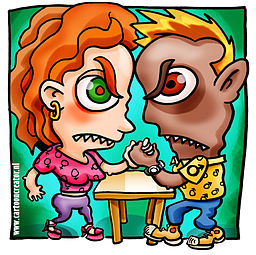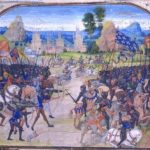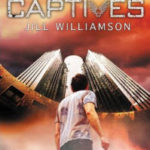Culture Wars And Speculative Fiction
 Culture wars seem endemic in all societies so disagreements and opposing factions should be a natural part of speculative fiction world-building. In western society today we see gender wars, moral issue wars (abortion, same-sex marriage), and increasingly, religious rights wars. Connected with those is the political power struggle and the influence of the media in framing the issues.
Culture wars seem endemic in all societies so disagreements and opposing factions should be a natural part of speculative fiction world-building. In western society today we see gender wars, moral issue wars (abortion, same-sex marriage), and increasingly, religious rights wars. Connected with those is the political power struggle and the influence of the media in framing the issues.
Are speculative fiction writers creating worlds that reflect these types of societal struggles?
J. R. R. Tolkien’s fantasy world is the gold standard of speculative fiction for so many reasons, but not the least of which is his portrayal of culture wars, starting with The Hobbit. Elves were distrustful of men but also had issues with other elves; dwarfs were distrustful of both men and elves, but a group also splintered from other dwarfs; and men were hardly in harmony with one another.
The culture wars continued in The Lord Of The Rings. Hobbits viewed hobbits in certain areas with suspicion; elves from one wood had little to do with elves from another wood; men of Rohan and men of Gondor went their separate ways; and even the antagonists had conflict, with Saruman plotting to usurp Sauron.
The point is, Tolkien gave his people groups things about which they disagreed. He gave them histories that included past offenses which caused grudges or prejudices. All dwarfs, for instance, did not see eye to eye. Some determined to return to the Mines of Moria and try to re-establish the glory days of that dwarf kingdom. Others feared such an attempt (rightly so, as it turned out).
The orcs, of course, display the greatest cultural conflict. Some are loyal to Saruman and others to Sauron. Some act from their own greed or fear while others do so to better their own standing with those in authority over them.
Karen Hancock created culture wars in her Legend Of The Guardian King tetralogy. The issue dividing society was religion.
 Patrick Carr also created a world with various internal conflicts in his The Staff & Sword Trilogy. While religion played a part in the internal struggles, the greater issue was power. He also utilized past offenses that separated or isolated people groups from one another.
Patrick Carr also created a world with various internal conflicts in his The Staff & Sword Trilogy. While religion played a part in the internal struggles, the greater issue was power. He also utilized past offenses that separated or isolated people groups from one another.
Jill Williamson used culture wars as the basis of her Safe Lands Trilogy. Initially the conflict seems to be those in the Safe Lands versus those from outside villages, but soon the basic dissatisfaction of a faction of Safe Landers surfaces. The culture wars take various directions but the main conflict revolves around those working to provide versus those living to consume.
Michelle L. Levigne created cultural conflict in her science fantasy Azuli Eyes, The Chorillan Cycle Book 1. A group of Gen’gineers—genetic terrorists—provide overt conflict, but there is also growing prejudice against families whose children succumb to the mysterious plague attacking a select number of adolescents.
Cultural conflict may seem easier to create in science fiction. Writers can capitalize on issues of today by extrapolating from them to create an “advanced” form of that same concept.
But fantasies need the same kind of cultural wars if a world is to seem realistic. What would gender wars look like in the world of an epic fantasy? What would be the moral issues that divide society? What would be the religions or religious practices that tear a society apart?
Without a doubt, culture wars ought to be a part of speculative fiction if the world-building authentically reflects society as we know it.
What books have you read that depict culture wars? What is at the center of those battles that divide a society? If you’re a writer, how have you used cultural conflict in your story?










































I’m surprised there aren’t more comments on this post! I’ve had it saved for a couple days to remind me to come back and comment. 🙂
I once heard that a book’s setting should not be static. Something in society should be changing, to make it more interesting. Culture war seems like an awesome element to bring to the table, to give a fictional world/country/place movement and upheaval.
I HAVE actually used culture war as part of my book’s world (or plan to)…in the second book of my trilogy there is significant friction over the topic of humans and Earth. Some people in that world want to cut off all ties with Earth and humans, while others think there is value in being connected to human society. There is a lot of animosity toward the human characters themselves, too, which is going to be really interesting and fun to write. I’m looking forward to exploring the culture war and seeing how it shifts my fictional world and affects all the people involved. 🙂 Eventually it escalates into an all-out civil war – but that’s because there are other factors involved too!
I confess that I have to work hard in this area. Because I am such a live-and-let-live person, certain kinds of conflict just do not compute with me. Fortunately (?) for my writing, a number of cultural clashes do lead to the kind of issues that I feel very passionately about, so I can still have something to say regardless.
Great post.
A good example of a culture war in secular SF is Nancy Kress’s Beggars in Spain trilogy. Normal humans create a genetically enhanced human race called the Sleepless, who no longer need to sleep and who quickly outpace us. Then they create an enhanced version of themselves called the Super-Sleepless, and you’ve got three different types of humans who can’t understand each other. Each of the groups has their own agenda, and it’s a good analogy to social class-upper/elite, middle, and new lower class.
I haven’t seen it much in Christian spec fiction, because most of it really doesn’t go beyond space opera/tolkien pastiches/paranormal ya. There’s the typical current culture war about abortion, etc, but not much idea of future or fantastic societies and their own needs. Like in a fantasy world, a Christian-analog having an affinity for magic that’s considered destructive, dark, or unclean vs a Christian who was raised that Christians only used white, blue, or green magic. You could see quite an internal culture war over that, and throw in the outside world who sees this and can’t understand why they bother.